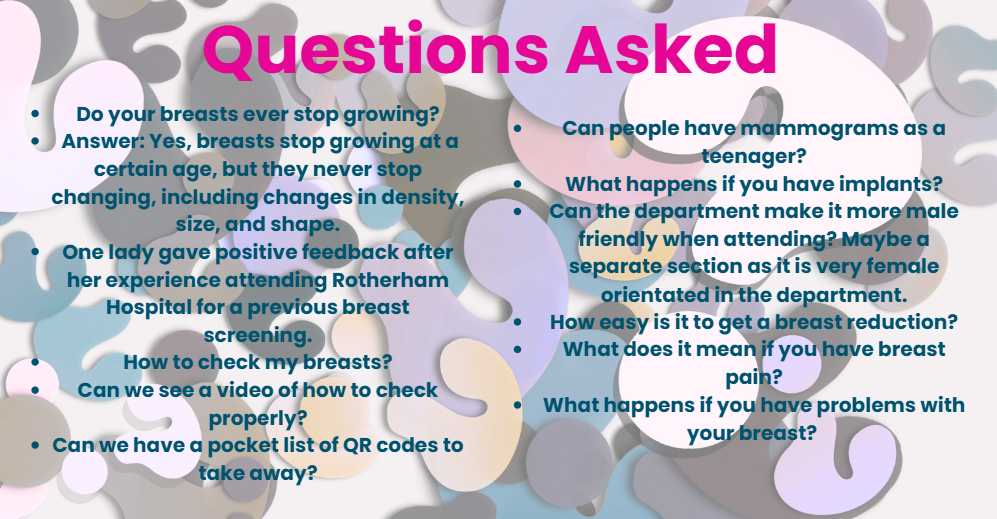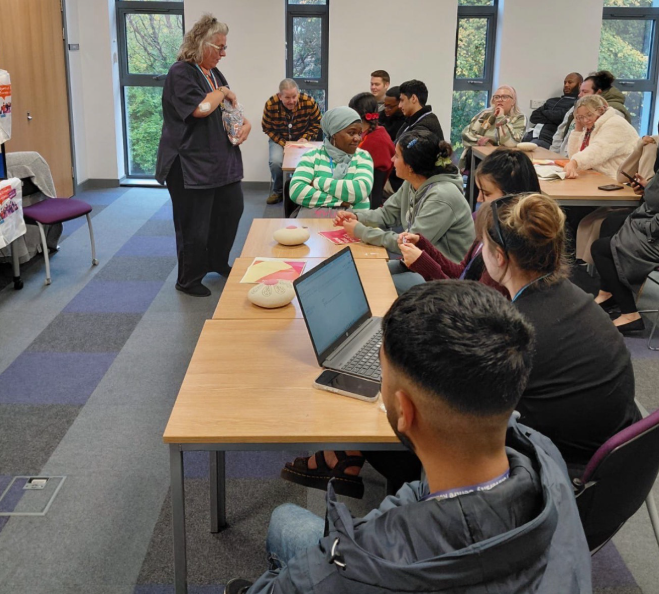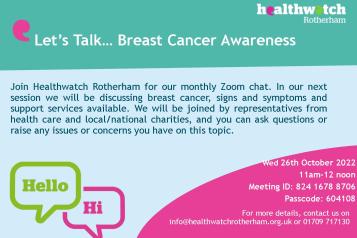Lets talk: Breast Cancer Awareness

The sessions were delivered by Faye, a Radiographer, and Lisa, a Sonographer, from The Rotherham NHS Foundation Trust. Danielle, Healthwatch Rotherham’s Research and Campaigns Officer, and Andrea, Community Engagement and Project Officer, also attended to observe and support engagement. The aim was to increase understanding of how to recognise early signs of breast changes, what to expect during breast screening, and to help students feel confident managing their own breast health.
Key Discussion Points
- Diverse participation: Students from a range of ages, sexes, and backgrounds attended, showing the value of inclusive and accessible health education.
- Breast self-examination: Guidance was provided on how to check for lumps, swelling, or other changes, with encouragement to make this a regular part of self-care.
- Recognising signs and symptoms: Students learned what to look for and when to seek medical advice.
- Understanding normal changes: Presenters explained that not all changes are a cause for concern, as some may be linked to hormonal cycles or other benign factors.
- Monitoring concerns: Attendees were advised to monitor any changes over one to two months, keeping a simple diary to help identify whether the changes are temporary or require further assessment.
- Breast screening and imaging: Faye and Lisa explained what to expect during a screening, including how mammograms and breast sonography work. Mammograms use low-dose X-rays to detect changes, while ultrasound scans (sonography) provide a closer look at specific areas of breast tissue.
- Creating a safe and supportive environment: It was highlighted that Rotherham Hospital provides a safe and supportive setting for breast screening. Anyone feeling nervous or anxious can speak to staff, who will do their best to accommodate individual needs and make the experience as comfortable as possible.
- Interactive learning: To help students put their learning into practice, a hands-on activity was provided where participants could feel a model breast containing different sizes and types of lumps. Students were invited to identify and count the lumps, helping them understand what different textures may feel like. Leaflets with useful information and self-checking guidance were also distributed for students to take away.
- Screening eligibility: Women aged 50–70 registered with a GP are automatically invited for a mammogram every three years, but all students; regardless of age or sex, were encouraged to regularly check their breasts, as early detection remains key to effective treatment.


The sessions were highly engaging and well received, with students actively participating, asking thoughtful questions, and expressing appreciation for the interactive approach. Many reported feeling more informed, reassured, and confident in performing self-checks and understanding what to expect from screening. The combination of practical learning and professional advice helped normalise conversations around breast health and encouraged students to take a proactive approach to their wellbeing.
Healthwatch Rotherham will continue to work with local education providers and healthcare professionals to deliver preventative health and wellbeing sessions, ensuring young people have access to accurate, accessible, and reassuring information about their health.
Healthwatch Rotherham would like to thank Faye and Lisa from The Rotherham NHS Foundation Trust for their expertise and engaging delivery, and Rotherham College for hosting this valuable awareness initiative.
Feedback from Faye and Lisa:
‘’It was our first time working with younger adults so we did take a few things few things away to learn from and help towards promoting to younger adults’’
- Show an actual video of how to check breasts (Visual aid)
- Put all QR codes onto pocket sized cards or all into one A4 sheet to take away.
- Prepare a basic generalised breast awareness quiz to break the ice and get more interaction.
- Possible prizes (Maybe sweets)
- Provide more prosthesis with lumps to put on each table.
- Maybe an anatomy quiz on breasts
Possible short presentation on a projector.
